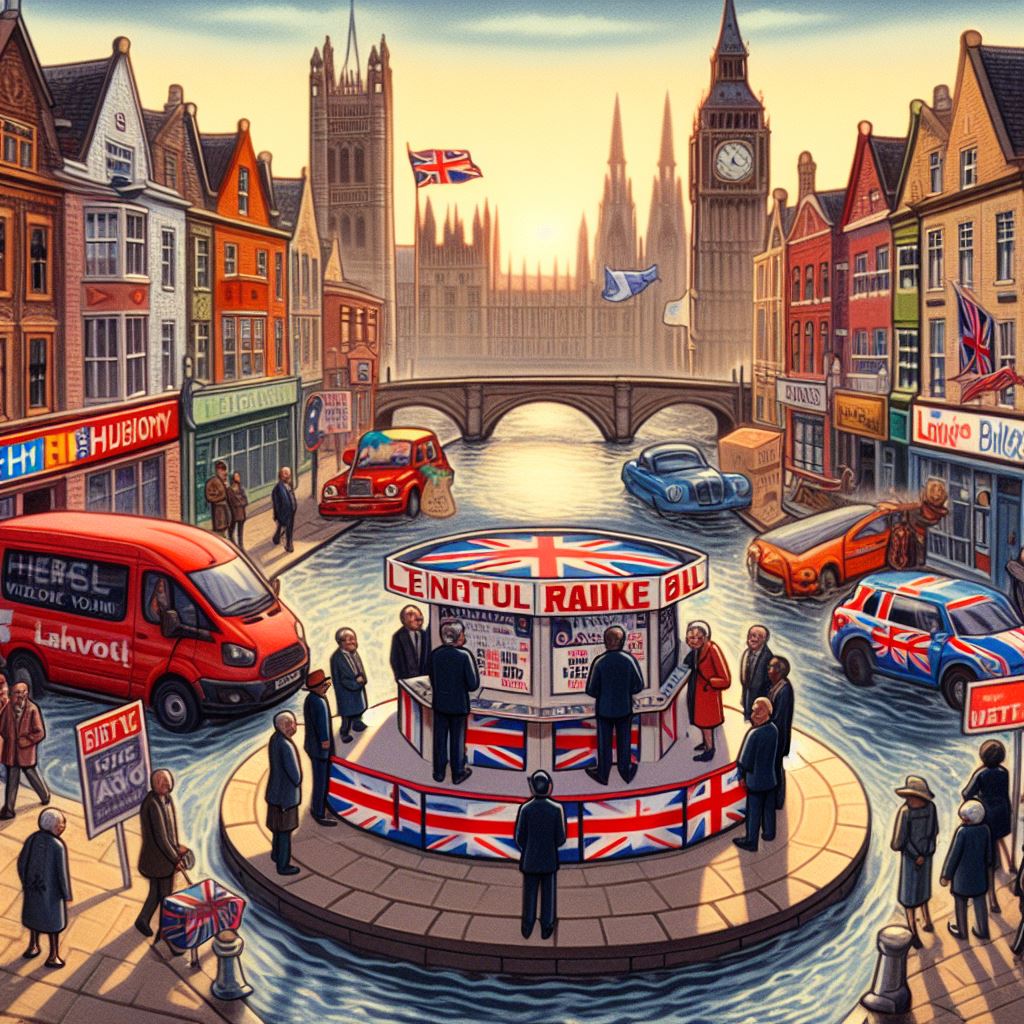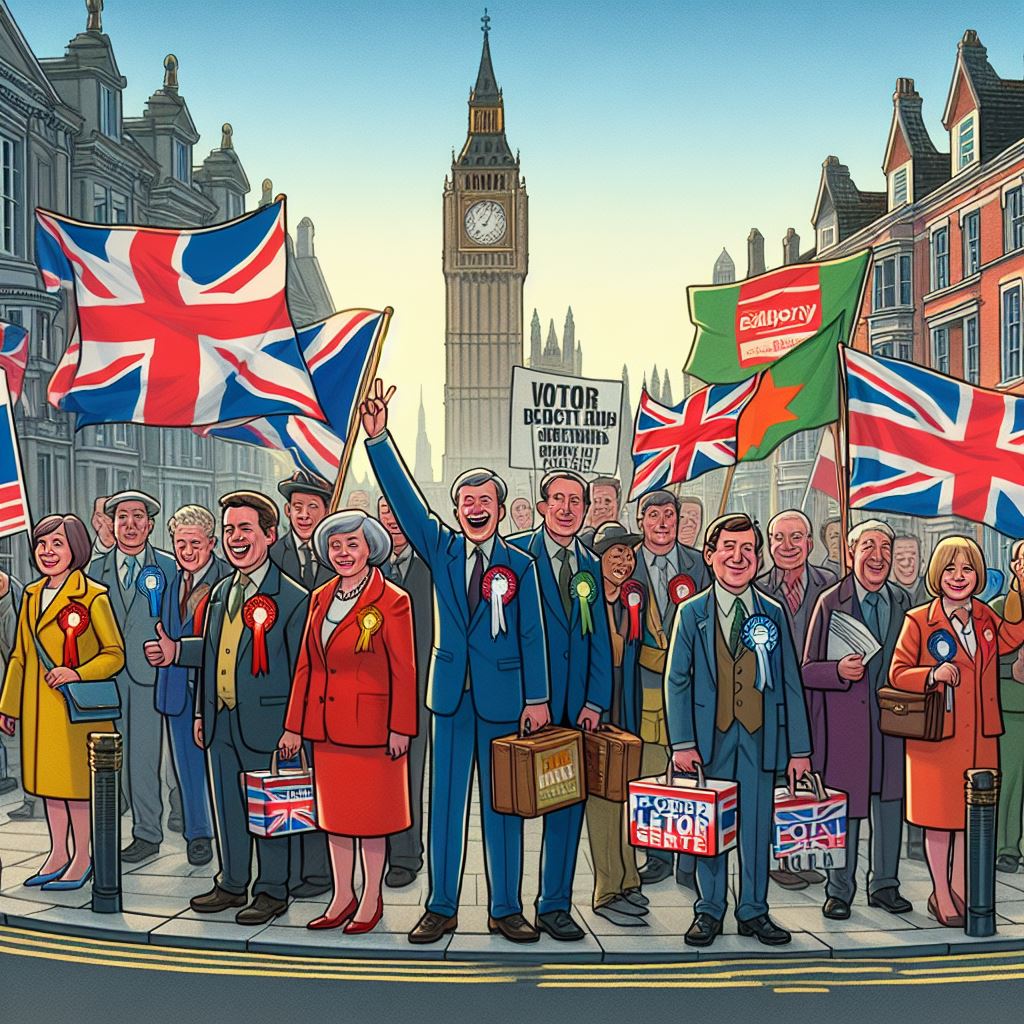
We will have to endure many more months of campaigning, but the result of the British general election due later this year is not in doubt. Political leaders, at least in the Labour and Conservative parties, are now turning to the election after that. That anyway is what their behaviour seems to reveal.
Of course some important things need to be resolved for 2024: will Labour have a small working majority, a landslide or be forced to work as a minority government (a coalition is most unlikely)? Will the SNP or the Liberal Democrats become the third-largest party in parliament? Who of the Conservative leaders in waiting will retain their seats? But there is no doubt that the Conservatives are shot and that Labour will win enough seats to form the next government. The harder the Tories try to change this outcome, the worse it gets for them.
This is an astonishing turn of events given the margin by which the Conservatives won the election in 2019. They had assembled an electoral coalition that harnessed the populist rage at liberal elites. Labour and the Lib Dems were on their knees, their electoral strategies in complete tatters; only the SNP were offering the Tories serious competition, and they were limited to the Scottish seats. What went wrong? First was incompetence. Boris Johnson the Conservative leader in 2019, was a brilliant campaigner for bringing desperate political constituencies together. But he was a useless prime minister, not least of whose failings was that he appointed mediocre or worse people to his cabinet (Nadine Dorris for heavens sake!), and kept changing them. The few points of light in his ministry (the rapid roll-out of covid vaccines; decisive support for Ukraine; ambitious commitment to climate change objectives, although with zero follow-through) required little actual political heft, and a bit of luck in the case of vaccines. Things didn’t get better after Mr Johnson’s departure, with the calamity of Liz Truss and hollowness of Rishi Sunak. Second was that the government had no answer to the populist policy trilemma: low migration, low taxes and low inflation. All three aren’t possible at the same time, and you need to decide which of them goes to the wall. Instead they pretended that the trilemma didn’t exist and failed on all three. And third, the electoral coalition had a weakness: it didn’t include younger people. This is not the case with similar movements in other countries (for example Donald Trump’s in America, or Marine Le Pen’s in France). This seems to be linked to two things, which are not so applicable to other countries: the way home prices have escalated out of reach for younger people, and the centrality of Brexit to the British populist narrative. Brexit never convinced many British younger voters, and events since have further tainted it. Remarkably, in Britain, the general rightward shift in people’s political alignment with aging isn’t happening. That means that the Tory coalition is weakening as older voters leave the electorate, and the coalition lacks strategic depth. See this analysis by John Burn-Murdoch in the Financial Times.
These problems run so deep that it is impossible for the Conservatives to fix them while still in government. The party needs to be radically reshaped, to freshen up their message with more appeal to younger voters, and to replace their current leadership with something much stronger. Many consider that this is impossible – but they said that about Labour after the 2019 election. Labour will come under pressure in government quickly, and the fate of Olaf Sholz’s government in Germany shows how quickly things can get rough for a centre-left government. They, too, will be faced by the tax-immigration-inflation trilemma. They have more ideas about how to tackle it than the current government, but it probably won’t be enough. There will be an opening for a populist party of the right, and with their organisational depth and networks, there is a much better chance of the Conservatives being that party than anybody else. Reform, their main competitor currently, may be doing well for now, but it is too much the personal creature of its founder, Nigel Farage, who is an able communicator but lacks the skills hold together a serious political party.
Conservative leaders seem to understand this. Potential new leaders are jockeying for position within the party, so that they will be able to hit the ground running after the next election. It is notable how most Tories aren’t even trying to sing the praises of their record in government, but spend their time criticising it. That even applied to Mr Sunak’s conference speech last October – when he sought to contrast his leadership with the previous thirty years. This is self-evidently a pitch for the election after next. The party is not seriously trying to win this time, because its knows the task is hopeless. They are instead trying to build the narrative for afterwards. Government polices are designed either to make political statements, or to limit any future labour government’s room for manoeuvre. The idea of tax cuts is sheer lunacy, and yet the government is determined to make them before it leaves office, predicated on impossible spending plans for the next government. Labour dare not challenge this. The Rwanda policy for relocating illegal migrants is predestined to fail, but it helps build a narrative of liberal elites and what the populist commentator Matt Goodwin calls their “luxury beliefs”.
The Labour leadership are waking up to the 2029 challenge, while desperate to keep its activists motivated for 2024. This best explains their recent ditching of a commitment to spend £28 billion a year on green investments. This was always a number plucked out of the air, and never fully backed by serious investment proposals. It was consciously following President Joe Biden’s radical investment plans after he won the presidency in 2020. That was then – but now inflation stalks the land, and that limits the headroom for such ambitions. Mr Biden’s policies exacerbated America’s inflation problems, and helped trash his reputation for economic competence amongst US electors. It was a promise a Labour government could not keep. Abandoning it will have little impact on this year’s campaigning – the Tory attack lines need only minor adjustment – but in 2029 Labour will want as few broken promises as possible.
Back in 2019, nobody thought the 2024 election would look like this. 2029 will be equally unpredictable. But the best guess is that there will be a strong populist challenge from the right to a stumbling Labour government. It makes sense that politicians now are preparing themselves for that challenge.

” But the best guess is that there will be a strong populist challenge from the right to a stumbling Labour government.”
Possibly, but you could be underestimating the significance of what is happening on the left.
George Galloway and his Workers Party is odds-on favourite to win in Rochdale. Jamie Driscoll is poised to beat the official Labour Candidate in the North East. The Liverpool Community Independents are gathering support. This is indicative of a widespread disillusion with the Labour Party under Starmer.
I don’t know if the various groups can be unified in time to have a significant effect in 2024 but they very likely will by 2029. That is if Starmer’s govt lasts that long!
I am sceptical of these movements on the left, but the dysfunction on the populist right could give an opening to a well-led movement from the left. I am reflecting on this on my next post, in preparation.
I don’t agree that the present campaign is over or even is a foregone conclusion.
Looking back at previous Parliamentary elections where Lib Dems did well under Charles Kennedy and Paddy Ashdown (1997 – 2005) we can see that the successful approach was to offer a more radical alternative to a right of centre Blairite New Labour. Nick Clegg benefitted from this in 2010 even though he probably didn’t agree with the Lib Dem manifesto at the time. Nevertheless he was astute enough to know when he was on to a good thing.
The present Labour offering is even more right wing. At least Blair had the good sense not to totally alienate the Labour left. He knew who he needed to do the legwork in any election.
They might have a big lead in the polls but their support is soft. Take a look at any forum, such as Facebook’s “Labour Party Forum” where party members and supporters can freely express an opinion, and you’ll see what I mean. It’s hard to find any support for Starmer at all.
It’s a big mistake to rely totally on winning seats from the Tories. The Labour Party are there for the taking. It wouldn’t take much. You don’t have to adopt an ultra left position. Just do what CK and PA did by offering at least a degree of radicalism.
That’s a very interesting thought Peter. You are right about the Lib Dems under Kennedy, though at the time I thought the party lacked coherence between its attacks on Blair from the left, and trying to win soft Tories too. Clegg benefited but failed to understand the implications when he went into coalition, and especially when he compromised on tuition fees. The party is still suffering from that, and for now the Greens are in a better position to exploit Labour divisions. But the Greens in fact have the same dilemma as the Lib Dems, as they are also taking votes from rural Tories (including where I live in true blue rural Sussex, with a Green local councillor). The Lib Dems are very much fighting for 2024 – with almost no reflection on what happens next!